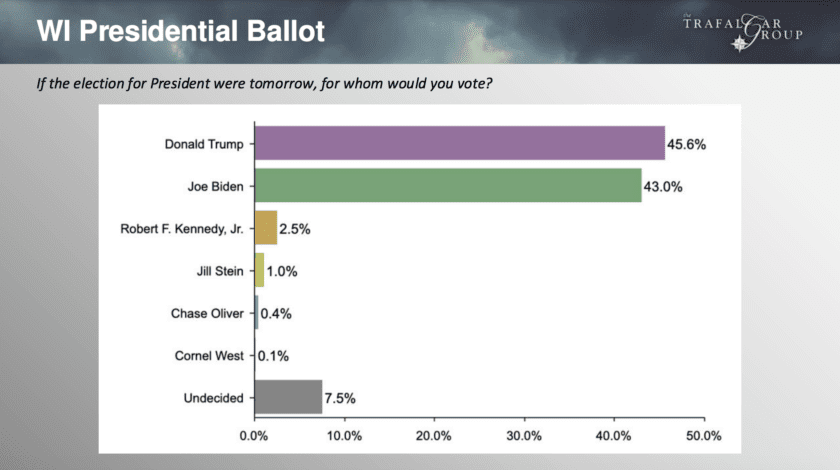Milwaukee looked fantastic on the world stage this week. Congratulations to the host committee, employees, volunteers, civic and political leaders of all partisan stripes who worked together to pull of the Republican National Convention.
Whether you watched all, some or none of the convention last night, we were hard at work compiling your Key Reads. Without delay, here they are…
The Trafalgar Group is out with a new poll of Wisconsin voters, conducted after the assassination attempt on former President Donald Trump on Saturday. We will share the topline results without spin.
The poll was conducted Monday July 15th, 2024 through Wednesday July 17th, 2024. Trafalgar polled 1087 likely voters. The poll has a margin of error of 2.9%.
Before delivering his speech last night, Trump had a 2.6 percent lead over President Joe Biden.

Some incredible news from the University of Wisconsin.
First plasma marks major milestone in UW–Madison fusion energy research – UW Madison News
A fusion device at the University of Wisconsin–Madison generated plasma for the first time Monday, opening a door to making the highly anticipated, carbon-free energy source a reality.
Over the past four years, a team of UW–Madison physicists and engineers has been constructing and testing the fusion energy device, known as WHAM (Wisconsin HTS Axisymmetric Mirror) in UW’s Physical Sciences Lab in Stoughton. It transitioned to operations mode this week, marking a major milestone for the yearslong research project that’s received support from the U.S. Department of Energy.
“The outlook for decarbonizing our energy sector is just much higher with fusion than anything else,” says Cary Forest, a UW–Madison physics professor who has helped lead the development of WHAM. “First plasma is a crucial first step for us in that direction.”
WHAM started in 2020 as a partnership between UW–Madison, MIT and the company Commonwealth Fusion Systems. Now, WHAM will operate as a public-private partnership between UW–Madison and spinoff company Realta Fusion Inc., positioning it as major force for fusion research advances at the university.
The promise of fusion energy
Like fission, its nuclear energy counterpart, fusion produces carbon-less byproducts, making it one of the cleanest potential energy sources in terms of greenhouse gases. Fission, however, produces long-lived radioactive byproducts that must be safely stored for long periods of time.
Fusion’s fuel — the inputs of the reaction — are abundant and relatively cheap: deuterium, a form of hydrogen with one neutron that is found in seawater, and lithium, an element needed in an amount that is mere fractions of what is required for today’s lithium-ion batteries. These are used to create the radioactive isotope tritium. Then fusion occurs when a heated plasma of deuterium and tritium ions is magnetically moved at rapid speeds in a reactor. The ions collide and fuse their nuclei, releasing energy. That energy is captured as heat, which can be used for industrial heating processes or converted to electricity.
City of Madison leaders are gearing up for immediate property tax hikes and a long-term lobbying effort to change state law to eventually get the power and authority to raise a myriad of taxes.
Facing years of budget woes, Madison moves to develop strategy to change state finance laws | Isthmus
“We have faced structural deficits for more than decade,” Madison Mayor Satya Rhodes-Conway said during a July 16 city council budget presentation. “This is a direct consequence of the state Legislature interfering with Madison’s ability to govern responsibly.”
Rhodes-Conway outlined two budget outlooks for the city — one accounting for a successful referendum, and another without referendum funding.
If voters were to approve a referendum asking taxpayers for an additional $22 million in operating funding on an indefinite annual basis, Rhodes-Conway said no further budget deficits or cuts would be expected until 2030. That might give the city an “adequate amount of time to make some progress at the state [level],” she added.
Both plans call for the city to raise $10 million in special charges by 2027. But without a referendum, the city would need to institute $6 million in cuts for 2025, or around 60 layoffs, and the city’s rainy day fund would be fully expended by 2029. Bigger budget deficits would come back as soon as 2027, according to the city, “with no obvious way to fill them.”
People continually ask the mayor’s office what it has done to address the financial issues, Rhodes-Conway said. But state law limits the tools available to city officials: levy limits are constrained and do not match inflation, Madison’s state revenue payouts are meager, and municipal sales tax authority — for cities other than Milwaukee — is non-existent.
…All in all, Madison city leaders say something has to change. The city of Madison is part of a statewide lobbying effort led by the League of Municipalities seeking finance reform
More troubling news for an iconic Wisconsin manufacturer.
Mercury Marine schedules partial layoffs for 1,700 workers amid sales slump | WLUK
About 1,700 workers at Mercury Marine have partial layoffs the rest of the year, as the company continues to cope with declining sales.
…“These are not permanent layoffs, but days we are not manufacturing which means the impacted employees are not working those days,” said Lee Gordon, vice president of corporate communications. “It does impact the majority of our hourly population in Fond du Lac.”
We are grateful for all the tourists, delegates and journalists who visited Wisconsin this week, many for the first time. They’re welcome to come back and spend their money here anytime. Next visit they won’t have to worry about the checkpoints or the strict schedule and will have time to visit more of this great state!
Enjoy the rest of your Friday and the upcoming weekend, everyone. We’ll be back on Monday.











